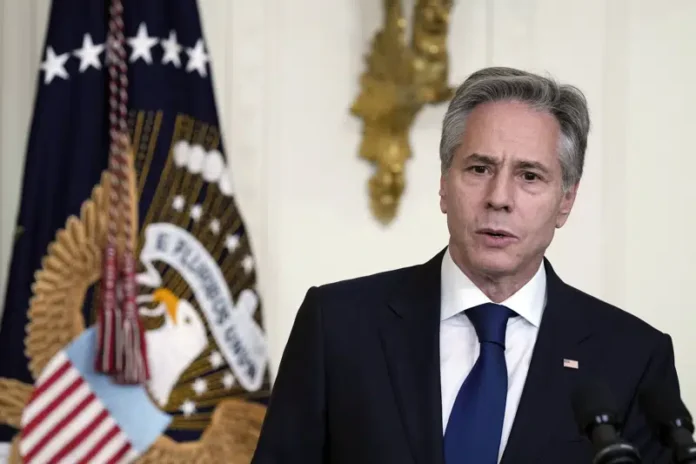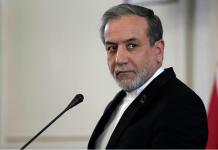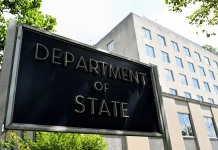WASHINGTON (AP) – In a major move aimed at improving communication and improving strained relations between the United States and China, US Secretary of State Anthony Blinken is scheduled to leave for China later this week. As the highest-ranking US official to travel to China since President Joe Biden took office, Blinken’s visit follows months of low-level engagement and ongoing hostility between the two countries. The State Department confirmed the trip on Wednesday, stressing the importance of maintaining open lines of communication to responsibly manage US-PRC relations while addressing bilateral concerns , also emphasized possible cooperation on regional issues and common challenges.
The decision to go ahead with the visit follows a phone call between Blinken and his Chinese counterpart, Foreign Minister Qin Gang, on Tuesday night. China’s Foreign Ministry, in its readout of the call, stressed the need for the US to respect China’s core concerns, such as Taiwan’s self-rule, and to stop interfering in China’s internal affairs. The ministry acknowledged that China-US relations have faced difficulties and challenges this year, stressing the shared responsibility to manage differences, promote exchanges and cooperation, and work together to strengthen ties.
The visit, originally scheduled for earlier this year, was postponed indefinitely after a Chinese spy balloon was discovered and shot down over the United States. Despite this setback, there have been subsequent engagements and talks, albeit intermittently. Tensions have risen in the South China Sea over China’s behavior, its actions against Taiwan and its support for Russia’s war against Ukraine. While diplomatic efforts are ongoing, including meetings between officials of the two countries, Blinken’s visit is an important step towards maintaining bilateral channels of communication.
Since taking office, the Biden administration has taken steps to counter Chinese efforts to gather global intelligence and build military capabilities. In particular, it has contested China’s activities in Cuba, where Beijing has sought to expand its overseas logistics and intelligence-gathering infrastructure. The administration has rapidly expanded its diplomatic presence in the Indian Ocean and Pacific Island countries, opening or planning to open several new embassies. These diplomatic efforts have reportedly slowed China’s expansion plans, as governments considering hosting Chinese bases have negotiated and shared key information with the United States.
Following his meetings in Beijing, Secretary Blinken will travel to London on June 21 to attend the Ukraine Reconstruction Conference. China’s visit is an important milestone in efforts to improve US-China relations, ease tensions and lay the foundation for future cooperation. Various global issues. As the Biden administration seeks to reframe its approach to China, the visit is seen as an important step in maintaining diplomatic dialogue and addressing shared challenges.
The visit, originally scheduled for earlier this year, was postponed indefinitely due to the discovery and shooting down of a Chinese spy balloon over US soil. However, low-level engagements between the two countries have taken place despite ongoing hostilities in the interim. Disputes over operations in the Taiwan Strait and the South China Sea, China’s refusal to condemn Russia’s actions in Ukraine, and allegations of China’s global surveillance activities have contributed to strained relations.
During his visit, Blanken will hold high-level meetings with top Chinese officials, including Foreign Minister Qin and possibly Chinese President Xi Jinping. These meetings are expected to explore possible areas of cooperation on bilateral concerns, global and regional issues and common challenges.
The visit comes against a backdrop of complex issues that have strained US-China relations in recent years. Tensions have risen in China’s stance toward Taiwan, starting with trade disputes and concerns about industrial espionage under the Trump administration, as well as human rights issues in Xinjiang, Hong Kong, and Tibet. Questions about the origin of COVID-19 have also contributed to the strained relationship between the two countries.
Although diplomatic efforts have been sporadic, tensions remain over China’s behavior in the South China Sea, its actions against Taiwan and its support for Russia’s war on Ukraine.
The Biden administration has taken steps to counter Chinese efforts to gather global intelligence and build military capabilities. In particular, it has countered Chinese activities in Cuba, where China has sought to expand its overseas logistics and intelligence-gathering infrastructure. The US has expanded its diplomatic presence in the Indian Ocean and Pacific islands to slow China’s expansion plans, engaging with governments considering hosting Chinese bases and sharing critical information.
Blankenship’s visit is seen as an important milestone in efforts to improve US-China relations, ease tensions and lay the foundation for future cooperation on global issues. As the first secretary of state to visit China since 2018, Blanken’s discussions with Chinese officials have the potential to shape the trajectory of the bilateral relationship. The visit also underscores the Biden administration’s commitment to maintaining diplomatic dialogue and addressing shared challenges.
In addition to the importance of the visit to US-China relations, it is worth noting that after his meetings in Beijing, Blinken will travel to London on June 21 to attend the Ukraine Reconstruction Conference. This further demonstrates the Biden administration’s diplomatic priorities and its engagement with international partners.
As the world closely watches Blinken’s visit to China, the outcome of his talks and the resulting developments in US-China relations will have far-reaching implications. The visit represents an important opportunity to de-escalate tensions.






